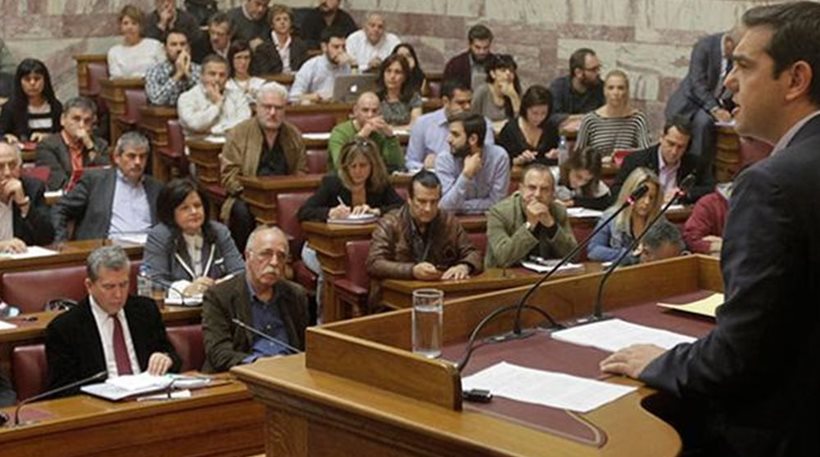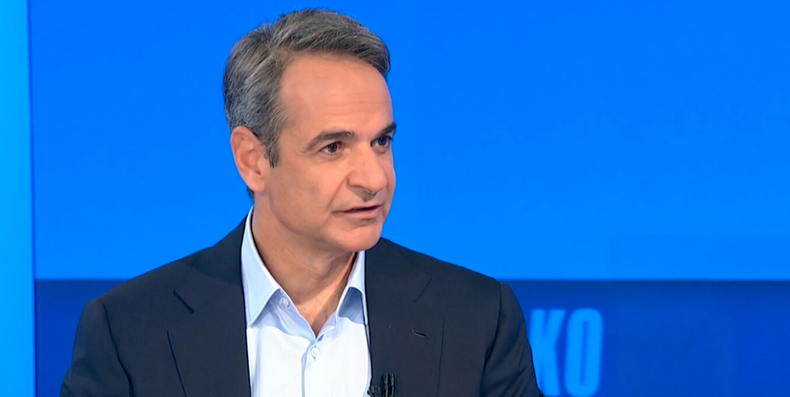Support towards ruling SYRIZA by most of its MPs was prevalent during a marathon 12-hour Parliament group meeting on Wednesday, held in the legislature’s senate chamber.
This was confirmed late into the evening when a majority of deputies approved an agreement that Finance Minister Yanis Varoufakis worked out with eurozone creditors within the Eurogroup framework.
Prime Minister Alexis Tsipras referred to the unity of the Parliament group at the start of a difficult quarter. “I want to know if you agree or disagree with the deal. If there is someone who will vote against it, I would like this view to be expressed here,” he said. Various versions of the results from the voting were heard with everything from five deputies who voted ‘no’ to numbers indicating that there were as many as 15-20 who rejected the deal.
“The agreement will depend on and will be judged from the way we operate as a government, with the promotion of our legislative work taking swift steps. We are governing according to the compass of the people’s mandate. We will wait to see how the other parliaments will ratify the agreement and then we will consider the framework of the political decision over the next 2-3 days,” he said.
Nonetheless, even deputies that voted in favor of the agreement weren’t without concern and reservations regarding the consequences of its application. They realise, however, that the government has no leeway other than falling out with its EU partners. “We aren’t happy with this deal, of course we have our reservations and know what it means,” said one SYRIZA deputy late into the night, following the voting. Phrases such as a “painful compromise”, “submission”, “grey zones of the agreement” were rampant during the discussion. Most deputies are convinced that the government has the chance ot exercise its policies and they are optimistic that the institutions with which they are in regular comment will not place challenging obstacles in the implementation of the reforms beign proposed.
“Until now we negotiated, but now we must govern,” said one deputy speaking under the condition of anonymity. “We achieved an agreement whose steadiness will be judged by the government’s work.” In this framework, the government is promoting its own legislation and its first bills will concern the protection of primary residences the 100 installments debt settlement plan.
The general view among SYRIZA deputies is that the conflict with Greece’s international creditors is ongoing and will depend on the level of demands as to whether a new deal will come at the end of the four-month extension period.
Prime Minister Alexis Tsipras’ statements
Tsipras said that the government showed that it can negotiate, and now it needs to show if it can govern. He made extensive references to contacts that he and Varoufakis had following the snap elections in January 25 right through to the last Eurogroup meeting. There were references to the negative climate that they had to face and the balances and relations between EU partners. The achievements of the governments were described as follows:
* Separation of the loan agreement from the memorandum bailout.
* Release of the connection of the memorandum from the framework policy of austerity.
* Achievement of an interim agreement that gives relief and avoids monetary suffocation with brief respite.
* An end to unrealistic primary surpluses.
* Securing the smooth operation of the financial system
He said that the government’s first goal was to build credibility and trust with the Greek people, something that was achieved following the Greek elections.
Productive Reconstruction, Environment and Energy Minister Panagiotis Lafazanis expressed some objections to the handling of the negotiations. “There was no discussion with the ministerial council concerning the handling of the situation before entering negotiations. There are points in the letter that do not sound like our language, but that of our investors,” he said. He said that privatization of the energy sector was a red zone, and categorically rejected any prospect of this happening.
Minister of State Nikos Pappas maintained that the government’s diplomacy was fruitful at both the EU leaders council and at the Eurogroup. “Our agreement allows us to apply the program and for this reason we need decisiveness and a joint front. Conflict is not the goal of the government. Our goal is for a better agreement for Greece and the people,” he said.
Chief Economic Spokesman Euclid Tsakalotos noted that the government managed to stabilize a situation and will be judged on its effectiveness henceforth, and this will be reinforced by Greece’s negotiating strength over the coming period.




































